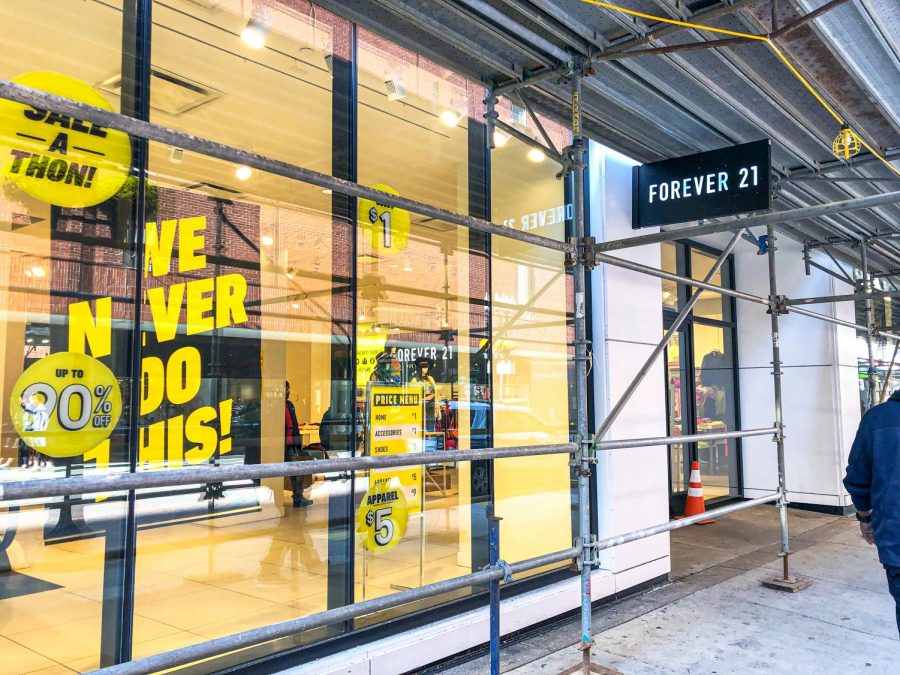Downtown Crossing is a hot spot for shoppers, with its streets lined with stores and restaurants. But now that Forever 21 and lower-end stores like it continue to close, and rent in Boston continues to increase, Downtown could change into a more upscale shopping district.
Forever 21 announced the closure of all of its Boston stores after declaring bankruptcy on Sept. 29. The fast fashion store is closing 178 locations, yet the only ones in Massachusetts that are being closed all happen to be in Boston.
The store’s Downtown Crossing location on Washington Street, the Newbury Street storefront and the site at the South Bay Center are all on a list of stores set to close.
Abigail Craighead, a senior global and cultural communications major at Suffolk University, isn’t surprised about the closings. She said the Downtown Crossing Forever 21 location closed and reopened several times while she has been at Suffolk.
Because of the closing of an affordable clothing store, Craighead is concerned the district will become increasingly more expensive.
“[Downtown Crossing) is becoming more and more expensive as the years go by,” said Craighead in an interview with The Suffolk Journal. “Downtown [has already been somewhat gentrified], which included Forever 21, once it came in.”
Overlooking Downtown Crossing is Millennium Tower, a 60-story apartment building that opened in 2016 on Franklin Street. According to LuxuryBoston.com, the condo prices start at $1.15 million and a one-bedroom apartment starts at upwards of $4,000.
This is a contrast to what Downtown Crossing was like 60 years ago. Then known as the Combat Zone (officially the Adult Entertainment District), the area was filled with X-rated movie theaters, prostitution, peep shows and adult bookstores.
While Downtown Crossing has since been cleaned up, some students are worried about the more upscale additions to the area and what closures of lower-end stores could mean.
“We are seeing a second wave of [gentrification] with the construction of Millennium Tower pushing out brands,” said Craighead.“H&M left, now Forever 21’s leaving, so now it’s a higher form of gentrification where not only are we pushing out low income [shoppers], we’re also pushing out the middle class.”
NeighborhoodX reported that in August 2018, the average asking price in Downtown Crossing per square foot was $1,751.
With luxury apartments raising the property value of Downtown, it is difficult for cheaper retailers to keep up with their own rent and leases.
According to CNBC, the stores Forever 21 plans on closing are their least profitable and cannot keep up with their leases.
Payless Shoesource filed for bankruptcy and closed its Downtown Crossing location over the summer. The more expensive shoe store, DSW, is still in business on the same street.
Despite these changes, students are still fans of the shopping district.
“Downtown Crossing is not too expensive. It has many affordable options if you are trying to stick to a budget,” said Allie Rodrigues, a sophomore psychology major, in an interview with The Journal.
Forever 21 was seen as a convenient and affordable shop, mainly catered to college-aged customers.
“The convenience for me to go and try on the clothes I would like to buy is going away,” said Rodrigues.
Having that type of clothing store so close to campus made it so students did not have to worry about finding affordable clothing on top of everything else. While Primark, a store in the same price range as Forever 21, is still open, students’ options are even more limited.
The rising costs of rent for residents in the city also concerns Suffolk students.
According to Northeastern’s Greater Boston Housing Report Card of 2019, Boston’s rent has gone up 64.6% from 2013 to 2017.
Suffolk is in the middle of Downtown Boston and only guarantees two years of housing. Many students find housing in other parts of Boston, such as Allston and East Boston, where there are lower rent prices.
“I am concerned with my management of renting and keeping a steady income to afford rent,” said Rodrigues.
Students enjoy Suffolk because of its location, but with limited housing students wish there was a more convenient way to live in Downtown.
First-year media/film major Nicole Geary wishes there was more housing offered by the university.
“I know Suffolk is a commuter school, but it really sucks that we can only live on campus for two years. I would love to live here all four if I could,” said Geary. “I mean, when else am I going to be able to live here in the center of Boston without having to pay $3,000 a month in rent?”
Students are worried about rising prices in other areas, too.
“I think it’s sad that [rent] is becoming more expensive,” said Craighead. “Our tuition is raised two grand a year, so on top of that, adding [rent] increase it’s just making Suffolk just more and more inaccessible.”
Increased prices in retail and rent are a looming worry for college students. According to them, they’re starting to feel the impacts of Boston’s changing financial climate.














